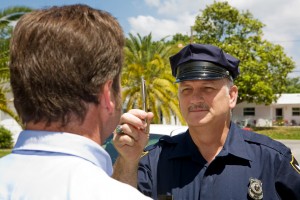When traffic cops are trying to evaluate whether a driver is likely sober versus intoxicated, one of the tools they have at their disposal is field sobriety testing. In fact, the results of this testing can serve as probable cause to request BAC testing and, in turn, to make DUI arrests.
Given that field sobriety testing plays such a crucial role in many DUI stops, below, we’ll point out some of the most important things to be aware of when it comes to this testing.
Field Sobriety Testing during DUI Stops: Here Is What’s Important to Know
1 – Not all field sobriety tests are the same.

A trusted Birmingham & Montgomery DUI attorney reveals some important facts about field sobriety tests administered in DUI stops. Contact us for the best DUI defense.
In fact, although the National Highway Traffic Safety Administration (NHTSA) has developed standard field sobriety testing, in practice, traffic officers can use any combination of these tests – or even other tests – to try to assess whether a driver seems to be intoxicated.
This means that the field sobriety tests one driver is asked to submit to can be different than those another driver is given. While this may not seem like a big deal, it can be, particularly when cops may be using “tests” that have not been proven indicators of intoxication.
2 – There are not objective standards for evaluating drivers’ performance on these tests.
Mirroring the lack of a standard when it comes to the administration of field sobriety tests, there is also a lack of an objective standard for evaluating these tests. In other words, there is no set metric against which officers can judge drivers’ performance to definitely determine intoxication.
This means that it’s possible (and not uncommon) for cops to misinterpret drivers’ performances as signs of impairment when, in fact, they may be related to other issues – like, for instance, a medical condition, etc. Knowing this can serve as the basis to argue that the results of field sobriety testing should not be evidence against a driver accused of DUI.
3 – Drivers can refuse field sobriety testing without being automatically penalized.
This may be the most important fact to know about field sobriety testing, as it can help drivers avoid doing anything that would give cops/prosecutors a stronger case against them. The bottom line is that drivers have the right to refuse field sobriety testing and that doing so won’t result in an automatic driver’s license suspension (or other penalties)
It may, however, trigger a cop to request drivers to submit to BAC testing (the refusal of which will result in an automatic driver’s license suspension).
Are you surprised to find out any of these facts about field sobriety tests for DUI stops? Sound off on our Facebook & Google+ pages.
Birmingham & Montgomery DUI Attorney at Joe Reed & Associates, LLC
After a DUI arrest, you can count on an experienced Birmingham & Montgomery DUI attorney at Joe M. Reed & Associates LLC to be aggressive advocates for your rights. For more than 16 years, we have been dedicated to the pursuit of justice in every case we oversee, and our experience, dedication and extensive knowledge of the law makes us effective at helping our clients obtain the best possible outcomes to DUI cases.
To discuss your case and your best DUI defense options, attend an initial consultation with one of our lawyers. You can set up this meeting today by calling us at 334-834-2000 or by emailing us using the contact form at the top of this page. Initial consultations are free in most cases, and evening and weekend appointments are available for your convenience.
